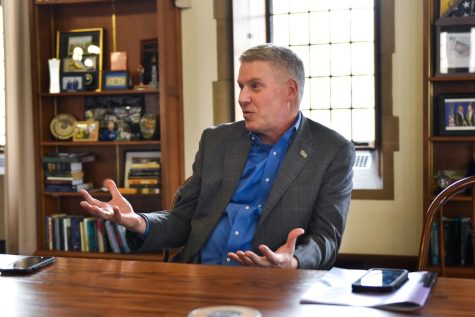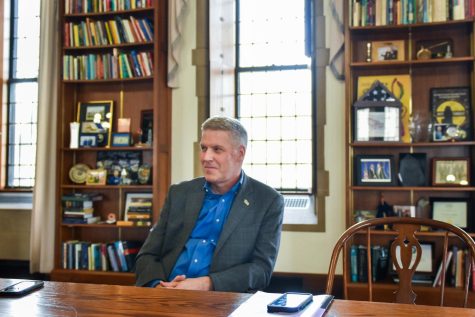There’s not necessarily a “natural moment” to announce you want to step away from leading a $2 billion research university, according to Pitt Chancellor Patrick Gallagher.
“It’s not an algorithm, there’s no kind of north star on these things,” Gallagher said. “It was kind of a judgment call, and a desire on my part to not wait so long that I had waited too long — and that it was kind of obvious that I should have done it. I just felt like it was better to err on the side of ‘do it on my own terms.’”
Gallagher, who has served as Pitt’s 18th chancellor since 2014, announced earlier this month that he will step down in summer 2023 after nine years on the job. The chancellor spoke exclusively last Wednesday with The Pitt News about his tenure at Pitt, the decision to step down and what lies ahead for him.
Gallagher joined Pitt in 2014, succeeding Mark Nordenberg as chancellor. He previously spent many years in public service, including as director of the National Institute of Standards and Technology. He holds a bachelor’s degree in physics and philosophy from Benedictine College in Kansas and a Ph.D. in physics from Pitt.
The 59-year-old chancellor said none of what he described as the typical reasons for stepping away from a position — retirement, illness, being fired or taking a new job — were true for him. Instead, Gallagher said his announcement was “basically sending up a flare” so the University community knew about his plans.
“It’s not a lifetime appointment, nor should it be. And so once I wasn’t going to sort of have some external circumstance dictate the timing, I kind of had to do it,” Gallagher said. “Now this is the world’s longest two-week notice in history, right? It’s designed to give the Board the time to adopt to this, let the University [adopt]. I’m staying until it’s successfully concluded.”
The chancellor worked on many different initiatives during his tenure, such as the Pitt Success Pell Match program with Provost Ann Cudd, in which the University matched federal Pell grants.
Gallagher also created several long-term programs to build for Pitt’s future. He launched Victory Heights with Athletic Director Heather Lyke, an ambitious program to rehabilitate and construct new sports facilities on upper campus. The University also gained City approval for a long-term institutional master plan to guide construction over the next few years. The first strategic Plan for Pitt was released in 2016, with a second version published last summer.
The last few years included many complex situations on campus. Graduate students narrowly voted against unionizing, while faculty members overwhelmingly backed unionization last fall. Student activists appeared to successfully pressure Pitt into halting new fossil fuel investments and prompt a selloff campaign, though it will be slower than they would have liked. Gallagher has also steered the University through the difficulties of the COVID-19 pandemic. And the University now faces, as Gallagher put it, state legislators seeking to use “leverage” over its state funding, which provides reduced tuition to in-state students.
Reflecting on his tenure as chancellor, Gallagher said the “most important thing” which has stayed the same since he joined Pitt is that both what Pitt is and what it does has “never been more important.”
“It may be more questioned now — there may be open national questions about the role of higher education and role of research — but I think it’s never been more important,” Gallagher said. “This is not a University in search of a mission.”
Gallagher added that he believes Pitt’s role in the region “seems to be even more important.”
“Our role in our communities has really strengthened — this idea that we’re an anchor institution, and Pittsburgh depends on us to create those strengths,” Gallagher said. “As an institution of learning, I mean we’ve never seen demand like this. We’re seeing students from not only all over Pennsylvania, but all over the country, around the world, applying to come here in numbers we’ve never seen before.”

Changes that he’s seen aren’t coming from within Pitt, Gallagher said, and are instead coming from the national level. He finds it “interesting” that the role of universities in the post-World War II era is under debate, and said the country is “kind of waffling a little bit.”
“Now that countries around the world are spending a large part of their national treasure to copy and compete with us, we’re suddenly wavering about whether this was a good thing to do or an important thing to do,” Gallagher said. “We’re watching the number of men going into college declining relative to the number of women. We’re seeing state legislatures across the country, not just the Pennsylvania situation, trying to act like school boards for universities and tell them what they should teach and what they shouldn’t teach.”
Gallagher said it’s “really unfortunate” these conversations are occurring, with what he said was “no evidence” to truly question the role of higher education.
“In fact, the lifetime premium in terms of just economic wherewithal has never been higher between those with a college degree and those without,” Gallagher said. “I think for me that’s been the headwind that has gotten more significant during my time, and that’s hard. It’s not us — the good news is we’re going to face those headwinds from a position of relative strength. But they’re certainly frustrating and they’re certainly troubling.”
Gallagher said that, recently, the “little things” about serving as chancellor began to weigh more heavily on him, describing the role as one that “you have to pour yourself into.”
“It takes a commitment — you’re never off the clock. You’re very often in the public,” Gallagher said. “It takes an energy sort of at all times to do that. And I think there’s always a toll for that. And what you don’t want to do is realize that you’ve paid too big of a toll, right?”
Pitt isn’t the only major Pennsylvania university to face a transition at the top. Leaders at several other colleges and universities are also leaving their posts, including at Penn State, which will have a new president beginning next month.
Gallagher said the average tenure for a university leader “isn’t that long anyway,” adding that “maybe that says something about the jobs nationally,” while also noting turnover can often be cyclical in nature.
“A lot of us started at about the same time,” Gallagher said. “I don’t think there’s any one thing driving this, I don’t think this is the ‘great resignation’ or COVID or anything like that.”

Pitt, which has only had men serve as chancellor, said in a press release that the Board of Trustees will conduct a national search and expects to name Gallagher’s successor prior to his departure. Gallagher said he hopes the University will attract “diverse and vibrant and exciting and visionary” candidates.
“I mean, this is about your future,” Gallagher said. “It should not be a clone of me. We’re in a different place now than we were when I started, and you want somebody who’s perfectly suited, or best matched, to kind of take us that next [step].”
Among those surprised by the chancellor’s announcement, he said, was the chair of Pitt’s physics and astronomy department. Gallagher has said he would like to remain at Pitt as a full-time faculty member, and return to the classroom to teach physics.
“I used to be a high school science teacher, and so the idea of teaching introductory-level physics is really pretty appealing to me,” Gallagher said.
Asked whether he will seek ways to remain part of civic life, Gallagher said “I think there’ll be a lot — I think I will,” before adding that he is focusing his attention to “finish this job at full steam and then you’ll hear the gears grinding … as I sort of retool.”
As a professor, Gallagher would share in the collective bargaining agreement currently under negotiation between his administration and the nascent Union of Pitt Faculty, which formed last fall with overwhelming support. Asked whether he would pay dues and formally join the union, Gallagher said he would.
“I probably will, right?” Gallagher said. “That’s how you have a voice.”
Gallagher said Pitt has been known as a place that helped drive the region through the exodus of the steel industry to its current backbone of “eds and meds,” but added that Pittsburgh is a place that “not everybody in the community benefited from” — posing a challenge to create more opportunity.
“I think there’s now a more holistic, how do we create a Renaissance for everybody that lives here?” Gallagher said. “It’s really exciting, I think it’s right where a great university should be. It’s some of the most engaging and rewarding work I’ve done. And that would be a pretty cool thing to have at least started.”
Jon Moss has covered Pitt’s administration since spring 2019, and participated in more than a dozen interviews with the chancellor while writing award-winning coverage.
The post Exclusive: Gallagher reflects on tenure, decision to step down appeared first on The Pitt News.
https://ift.tt/ylIG8eM





No comments:
Post a Comment